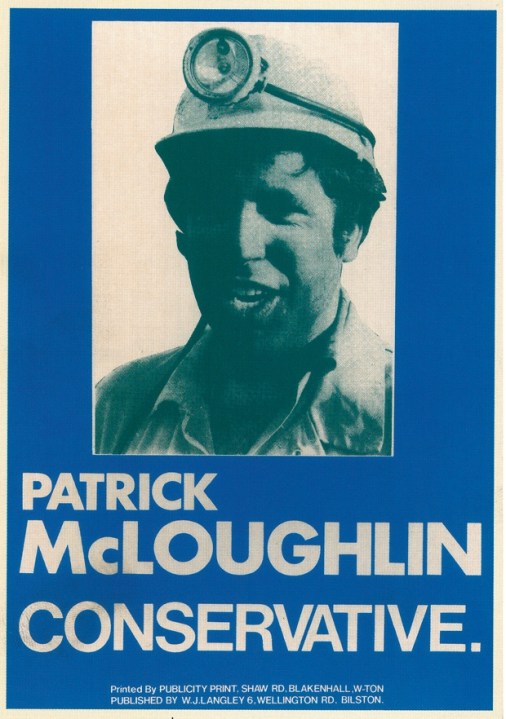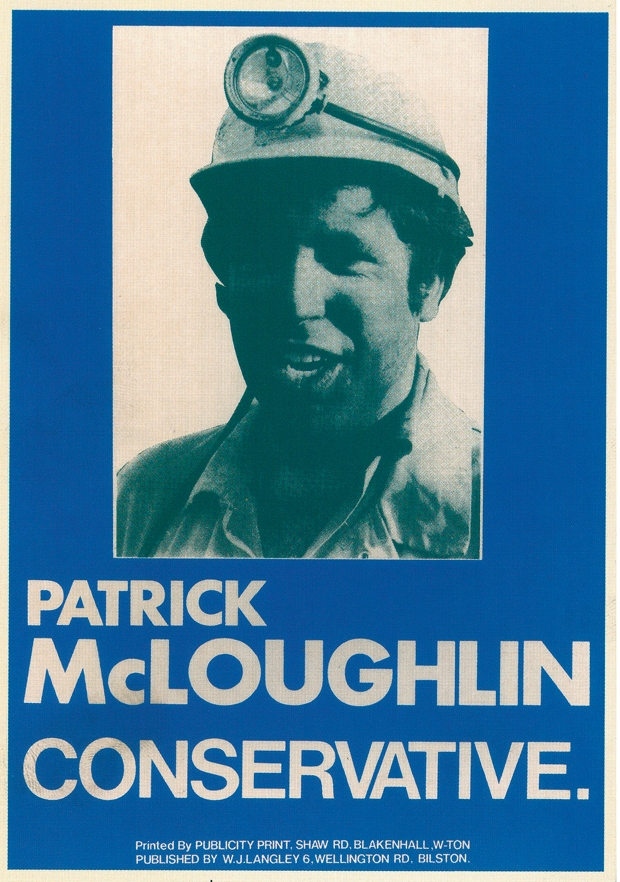It was, perhaps, inevitable that heading to interview the Transport Secretary I would end up stuck in traffic — so by the time I reached Patrick McLoughlin’s office, I was running a few minutes late. The normal punishment for tardiness is to be left languishing outside a minister’s office. But McLoughlin does things differently. When I arrive, his door is open and he urges me to come straight in.
As befits a man who used to earn his crust as a miner, McLoughlin has a big physical presence. He is broad-shouldered and the buttons on his shirt sleeves look close to bursting as they try to contain his large forearms. His physical appearance is just the most obvious of the many traits that make McLoughlin stand out in a cabinet dominated by Oxbridge graduates. His life has not been one of privileged ease.
McLoughlin was born into a mining family in Stafford in 1957. He had to grow up very young when his father died — leaving him, one of his elder sisters and his mother at home. He tells me that his mother went out to work at 6.30 a.m., so I ask if his sister got him dressed, given that he had just started primary school. He looks at me like I’m slightly odd, before chuckling and declaring, ‘No, we got ourselves ready.’ The conservative notion of self-reliance was something he learned young.
McLoughlin remarks ruefully that ‘I never really knew my father at all. He died the day after my seventh birthday, so 1 December 1964.’ When I ask more, McLoughlin replies, ‘I never really talk about my father, simply because I didn’t really know him. I mean the idea that you have this great relationship with your father by the age of six…’
But by the time McLoughlin went to work at Littleton Colliery in Staffordshire, where his father and grandfather had worked before him, he was already a Tory. This did not go down well with all his colleagues, who would tell him that his father would ‘be turning in his grave’ to know his son’s politics. McLoughlin says he developed a stock response: ‘Well, it would be good to see him still having some activity.’
He says that his fellow miners, though, were not all left-wingers. ‘Most of them were Tory-minded, but they just voted Labour. So if you talked to them on taxation, immigration, defence, the monarchy — they were far more right-wing than I probably am. But they just voted Labour.’
Conversation turns, as it so often does when talking with a Tory cabinet minister, to the threat of Ukip. McLoughlin is dismissive of the idea that his party should panic if (as expected) it is beaten by Ukip in the European elections in May. Chasing Ukip support misses the point, to his mind. ‘I don’t aim at Ukip voters, I aim at Labour voters, I aim at Liberal Democrat voters.’ Warming to his theme, he continues, ‘I’m not going to aim myself at 10 per cent or 12 per cent, I’m going to aim myself at the 60 per cent who don’t vote Conservative.’
McLoughlin, certainly, is not as Eurosceptic as many of his Tory colleagues. When I ask him if he’d vote ‘out’ in a referendum held today, like his cabinet colleagues Michael Gove and Philip Hammond, he replies: ‘I would be very reluctant to see us come out of the European Union. I think there’s a lot that is very positive about our membership, about what the single market offers.’ His answer makes me wonder how McLoughlin, who was Cameron’s chief whip for almost seven years, thinks the Tory party can be held together in the event of an in-or-out referendum. When I ask him if Tory frontbenchers should be allowed to campaign on different sides, he stonewalls. ‘That will be a decision to be taken closer to that time,’ he says.
The Prime Minister told this magazine in December that he ‘envisages’ all of his front bench voting the same way in the referendum. But this question remains a very delicate one.
McLaughlin is adamant that the days of expecting total loyalty from MPs are over. ‘The idea that somehow they are all going to be silent followers of one person is something that’s gone.’
Even as Transport Secretary, he can’t escape the subject of party discipline. There are a bevy of Tory MPs opposed to having HS2 run through their patch or a new runway built in their backyard. But McLoughlin has agreed to tolerate dissent. ‘You have to accept that certain people, certain constituencies are heavily impacted by a piece of national infrastructure,’ he says. ‘Those MPs have got a duty to stand up for their constituents and make the case for their constituents. You’ll never hear me criticise that.’
McLoughlin admits that the HS2 legislation won’t be through parliament before the next election: ‘I think one has to accept that perhaps through all its stages within the next 12 months is slightly ambitious.’ It will, he says, have ‘started its parliamentary progress’. When I ask if it will be done, he answers ‘no’.
This means that it could still become an election issue — Ed Balls, the shadow chancellor, makes occasional forays against it. But McLoughlin has a plan that may stop airport expansion being dragged into the next general election campaign.
In opposition, David Cameron was against expanding Heathrow. But in 2012, the government asked Howard Davies, an economist, to do a report on what runways Britain needs. He has been told not to publish his final conclusions until after the general election.
So I ask McLoughlin: does that mean there’ll be no general election between the report and the beginning of the building process? ‘Sitting here now, that would be what I would hope.’ Residents who’ll have to put up with a new runway, or even a new airport, will thus never get a chance to vote against it.
Talking to McLoughlin, one is struck by how calm he is. In a 45-minute interview, he doesn’t once raise his voice. Even the subject of Liberal Democrats and coalition, one that sends many of his ministerial colleagues into a fury, doesn’t rile him. Instead, he simply observes that ‘there was always going to be this tension in the last 12 months’. Such calmness is going to be much needed in the coming weeks and months as Cameron and company try to work out a way to keep the Tory party together — through and beyond the next election.







Comments